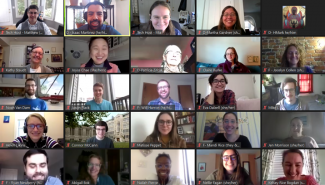When many hear the word “discernment”--particularly in Christian contexts--they think of the process of exploring ordained ministry within the church, but a recent lay discernment event for young adults highlighted the importance of this spiritual practice for all, especially young people wrestling with questions of who they are called to be in the world.
On Oct. 3, about 40 young adults ages 18-39 gathered online via Zoom for a lay discernment program organized by the Young Adult Advisory Committee of the Diocese of Massachusetts, a group created by a resolution adopted by the 2019 Diocesan Convention in response to a report by the 20s and 30s Task Force on engagement with young adults.
In an interview, the Rev. Isaac Martinez, a co-chair of the committee, said the Oct. 3 event came out of the months of listening that the task force participated in. The need for discernment opportunities emerged from that process as a clear need, as did a strong desire to network with other young adults throughout the diocese.
“Having an event was at the top of our list, to bring people together from the incredible breadth and diversity of the diocese,” Martinez said. “Especially for those young adults who may be the only person under 40 in the entire congregation, just to give them a sense that there are more people who share somewhat of their life experience, who are Episcopalian, who are Christian, who take their faith seriously.”
The idea for a young adult discernment event emerged when the co-chairs of the Young Adult Advisory Committee were discussing the formation of a Young Adult Network with Martha Gardner, the missioner for networking and formation on the diocesan staff, and were inspired by a lay discernment program for Province I dioceses that Gardner is working on.
"A charism of Anglicanism and Episcopalianism, when it comes to discernment, is to do it in community, and we do it very well if you’re discerning ordained ministry. My discernment committee was one of the most powerful experiences I’ve had as an Episcopalian, and definitely one of the most prayerful experiences I had," Martinez said. "From the moment I started that process I was like, 'Why isn’t this available to everyone in the church?' Even if they’re pretty sure that they’re not called to be a priest or a deacon, why can’t we do this?"
Working with Gardner and Archdeacon Pat Zifcak, who oversees formation for deacons and aspiring deacons, the leadership of the Young Adult Advisory Committee organized the October online event, facilitated by Dr. Kathy Staudt who, as a college and seminary teacher, spiritual director and writer, has taught at the University of Maryland, College Park, Wesley Theological Seminary and Virginia Theological Seminary.
“This work is to reclaim that word, discernment, for the whole church, because it’s an ancient practice in the Christian tradition,” Staudt said during the event. "It’s the practice of listening for God’s voice in our lives."
Staudt led the group through some Ignatian and Benedictine practices for listening and discernment, and spoke about the importance of doing discernment in community, highlighting the Quaker practice of using "clearness committees."
Participants then practiced an adapted version of a Quaker clearness committee in small groups, listening to a focus person with a “concern” and asking questions to help the person discern feelings and possible next steps.
“The things that stir us and make us feel as if we need to look a little more closely are by definition of God in this tradition,” Staudt explained. “That’s what we’re going for as we embark on this journey of discernment, more and more, to recognize when we’re being invited to order our lives more deeply around some central concern.”
The Oct. 3 event was built to be both a stand-alone event and a jumping off point for new discernment groups being formed by the Young Adult Advisory Committee. Participants at the event, as well as other interested young adults, are being invited to join ongoing discernment groups of six to eight people who will meet approximately once a month between November of this year and May 2021, bringing their questions about everything from careers to personal relationships to their roles in the church. The committee used funds from its budget to hire facilitators for these groups, to be trained in helping with this discernment process, and it hopes that this effort is just the beginning of a broader program about what discernment really is.
“In my experience, God is not as clear as I would like her to be sometimes, and I really not just value but need to be in conversation with people I trust to help me sift through all of my feelings and possibilities that arise before me to figure out what really is God calling me to,” Martinez said.
“I wish that I had blinding light and glorious epiphanies all the time, [but] that’s not my experience," Martinez continued. "Maybe that’s someone else's experience and for some people it is, one on one, just you and the Spirit working it out. But if you need someone and you need people on a foundation of trust and mutual vulnerability to really sift through what is really going on in your life and to pick out the signs, examine them prayerfully, spiritually, and then make decisions from there, that is so vital. And so that’s what I hope all of these discernment groups can become for these participants.”
--Bridget K. Wood
Learn more about Young Adult Ministries in the Diocese of Massachusetts here.

